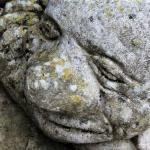Hello, beautiful creatures.
Previously on Outside the Charmed Circle, while discussing the high-larious accusations of cultural Marxism being levied against certain writers, I brought up a phenomenon I’ve noticed in various Pagan, polytheist, and magical practitioner communities over the last mumble mumble years I’ve been kicking around, that of certain parts of the community whose identities are wrapped up in—even centered on—their feelings of being victimized and oppressed. Of course, this is a touchy subject to bring up for a lot of reasons, not the least of which being that there are folks who’ve been genuinely, legitimately victimized and oppressed. They’be been the target of bad actors, individuals or institutions who’ve behaved abusively. I am not, I repeat, not talking about them.
What I’m talking about is a power dynamic which conforms to a definable pattern of behaviors, and which plays itself out with dismaying regularity: Stephen Karpman’s drama triangle, a model of social interaction and conflict based on Karpman’s work in transactional analysis under Eric Berne and his abiding love of theatre. In this model, participants choose, or are placed into, one of three roles: the Victim, the Rescuer, and the Persecutor. Each of these three roles plays an integral part in the power dynamic, and depends on the other two fulfilling their roles to perpetuate the dynamic. Summarized with wild abandon, it looks like this:
- The Victim relies on the Persecutor to be “the bad guy” and the Rescuer to protect them.
- The Persecutor relies on the Victim to receive their abuse, and the Rescuer to challenge them.
- The Rescuer relies on the Persecutor being a bad actor towards the Victim, and the Victim being powerless.

Why is this particular power dynamic endemic to our communities? Well, as usual, it all comes back to power. If we’re willing to take a good, long look at ourselves, individually and collectively—that is, we’re honest with ourselves, about ourselves—I think what we’ll find is that a substantial number of people come to Paganism, polytheism, and/or magic looking for power. There are as many motives for seeking power as there are people, but I suspect they can be loosely divided into three groups.
- Some are looking for sorcerous might, witchcraft, practical magic, and other forms of spooky woo-woo intended to Get Shit Done in our day-to-day lives. Maybe they want to get a job, or to get laid, or to get an undesirable person out of their lives. In short, they’re looking for power over the external world.
- Others are looking for power within their internal worlds: to heal from trauma, to compensate for some shortcoming (perceived or actual) in their lives, or in some other way to counteract emotional or spiritual issues.
- Still others—and I’d like to believe this is a relatively rare group, but I may be too optimistic—are simply predators looking to feed on power… and in the target-rich environment of a community made up of power-seekers, many of whom are needy and insecure, they find all the prey they could ever want.
Now, I’m not saying that the three groups I’ve just described are a perfect match for the three roles of Victim, Persecutor, and Rescuer as described above. I am, however, suggesting that there’s a lot of overlap between the behaviors of people looking for personal power (their own or someone else’s) to fulfill their needs and the behaviors ascribed to those three roles. Honestly, in an environment like the one I’ve described, I’d be shocked if Karpman’s drama triangle wasn’t one of the dominant power dynamics in play.
Next time, I want to dig a little further into how these dynamics manifest in the p-word communities, and how we can work against their tendency to become toxic. In the meantime, if you’re interested in reading Dr. Karpman’s work on the drama triangle and transactional analysis, I encourage you to visit his website.
Until then, dear ones, play nice. ♥

















